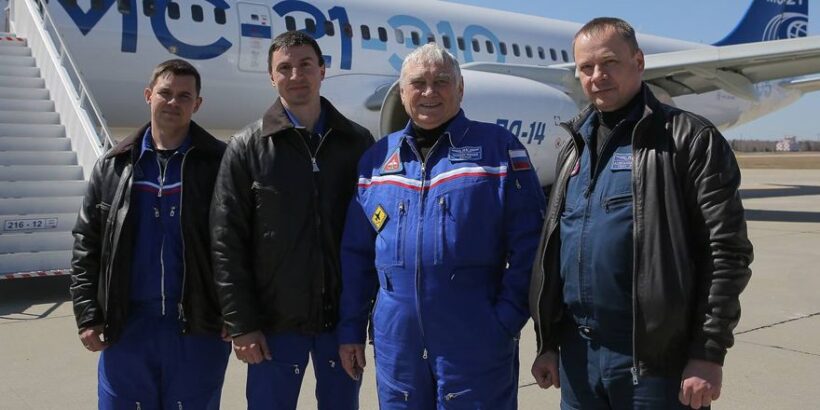On 29 April 2025, the MC-21-310 prototype aircraft (tail number 73055), which underwent modification under the import substitution programme at the Irkutsk Aviation Plant, completed its maiden flight. The aircraft was flown by a crew consisting of Hero of Russia, Director of Flight Testing at PJSC Yakolev, Roman Taskaev, and First Class Test Pilot at PJSC Yakolev, Alexander Guskov. Leading Flight Test Engineers at PJSC Yakolev, Alexander Popov and Alexander Solovyov, monitored the operation of the onboard systems and recorded their parameters. In an interview with the UAC press service immediately after landing, the crew shared details of the first flight and assessed its results.
Roman Taskaev emphasised that the aerodynamic characteristics of the aircraft remained the same, as the airframe structure was unchanged. At the same time, the characteristics of the import-substituted equipment are on par with, and in some parameters even exceed, their foreign counterparts. The crew are satisfied with the performance of all systems.
“We are satisfied with the operation of the systems and complexes, and we are eagerly awaiting permission for further work. The power system has undergone the greatest changes during import substitution. Therefore, our main focus was on the power system, as all other systems depend on it,” said Roman Taskaev.
According to Alexander Guskov, standard regimes were performed during the first flight to assess the aircraft’s stability and handling. Different configurations were tested: with flaps and landing gear extended and retracted. The crew also assessed how the systems perform when approaching speed limits – maximum and minimum.
“Naturally, there is a specific methodology here; everything progresses from simple to complex. First, a simple pass is performed, and we observe how the aircraft behaves near the ground. We performed it at 100 metres, then moved further away and extended the [flaps] to an intermediate position with the wheels down. We also looked at how it behaves during a go-around, whether there is any reaction when increasing engine speed. After that, we performed two landing approaches, the second of which culminated in a landing,” he said.
Alexander Popov noted that the task of the engineering and test crew was to conduct in-depth monitoring of system operation. For this purpose, additional parameters are displayed on the monitors of specially equipped stations, allowing for detailed assessment of equipment performance. The engineers also provided methodological support to the pilots. According to him, the flight went perfectly, and all systems operated normally.
Alexander Solovyov also shared positive impressions. All regimes were performed successfully, and the systems demonstrated good performance. No problems were detected, he added.
The reliable operation of the onboard power system is critical to all other aircraft systems. It was the electrical power supply and distribution system that posed the greatest challenges and delays in the import substitution process. The total length of the cable network on MC-21 aircraft exceeds 70 kilometres.
A source at the Gromov Flight Research Institute (LII) highlighted the system’s complexity and cited the French company Thales, whose specialists took seven years to develop a similar system for the MS-21-300. Russian engineers were able to solve this problem in a shorter time. “Now that the functionality of the power supply system has been confirmed, work on integrating domestic components on other aircraft (airframe 73057 and several production aircraft) will be accelerated,” he said.
Plans for May include performing 3-4 flights as part of the refinement test programme to assess the aerodynamic corrections of the ADS (Air Data System), APS (Automatic Pressurisation System) at high altitude, as well as the combined operation of the INS (Inertial Navigation System) and FMS (Flight Management System) to assess navigation accuracy. After that, the aircraft will be ferried to Zhukovsky, where it will undergo certification testing.


